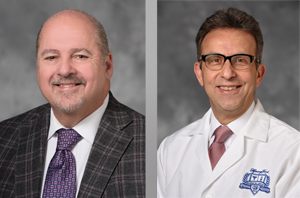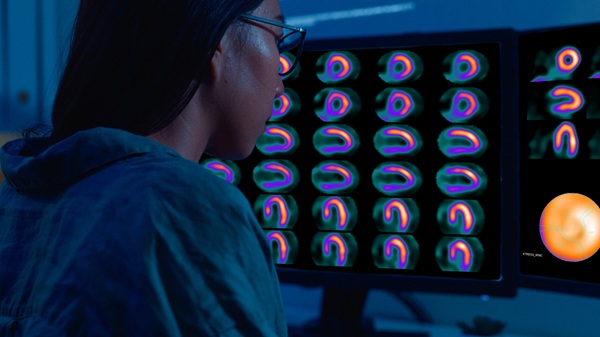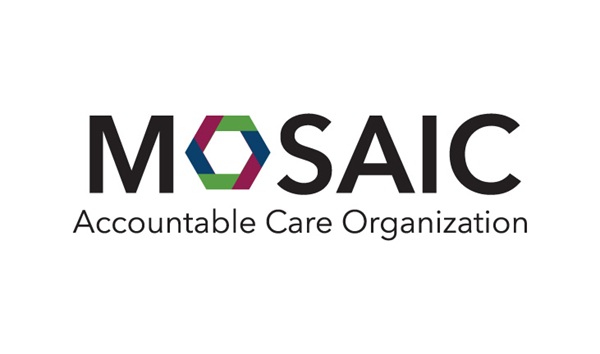Henry Ford Tops 100,000 Vaccine Doses Administered as New Vaccine Trial Launches

DETROIT (February 16, 2021) – Even with COVID-19 hospitalizations and the number of new cases at Henry Ford Health System hospitals now at their lowest level in more than 4 months, and nearly 1 million Michiganders now fully vaccinated, Henry Ford leaders are saying that masks, social distancing and other precautions that have been the key to getting the virus under control are likely here to stay.
That was the message during a Monday news briefing from Henry Ford COO and President of Healthcare Operations Bob Riney, and Adnan Munkarah, M.D., Executive Vice President and Chief Clinical Officer.
“As more people either recover from COVID-19 or are vaccinated, we are moving from a world where COVID-19 is a pandemic, to one where the disease, just like the flu or other viruses, is endemic – meaning that COVID-19 and its mutations will continue to be an ongoing threat to human health,” said Dr. Munkarah. “This means that many of the changes we have seen in how we deliver healthcare will be here to stay.”
Dr. Munkarah believes that mask wearing by caregivers, patients and visitors, and other precautions such as temperature screenings, are likely to become part of the so-called new normal. “These precautions protect people from communicable disease – not just COVID-19, but other illness such as flu and other respiratory illnesses and will make our hospitals and clinics safer.” Dr. Munkarah said.
One other big change is greater reliance on telemedicine to meet the needs of patients without the need for an in-person office visit. Since the beginning of the pandemic, telemedicine visits at Henry Ford have skyrocketed from just a few thousand visits in 2019 to more than 300,000 visits since last March.
“Our experience during the pandemic has demonstrated the effectiveness of telemedicine in evaluating health concerns, diagnosing and treating minor illnesses, and determining whether our patients need to be seen in person,” said Bob Riney. “We will soon introduce new home-based telemedicine tools that will make these visits even more robust.”
With the growth of telemedicine and the need for social distancing, Riney says healthcare facilities themselves will likely change as well.
“We are going to see smaller waiting rooms, and in some cases, maybe no waiting room at all,” said Riney. “COVID-19 is forcing us to completely rethink the hospital and healthcare environment.”
Other key topics covered in the media briefing include:
- Henry Ford Health System has now administered more than 101,000 first and second doses of vaccine
- This week, Henry Ford received 3,950 first doses of vaccine and 10,500 second doses from the State of Michigan. Appointments have been made for all available doses
- Henry Ford has launched a new COVID-19 vaccine trial testing a 2-dose regimen of the Johnson & Johnson’s vaccine, which has been submitted to the FDA as a one-dose vaccine. Henry Ford was also a Phase 3 testing site for that version of the vaccine. Volunteers age 60 and older may register on the Henry Ford website to this link
- Henry Ford is partnering with the City of Detroit and Second Ebenezer Church for the “Senior Saturdays” program that will vaccinate 2,000 city residents at the church over the next two months
- Henry Ford announced that it is easing some restrictions in its visitor policy. The revised policy can be found at this link on the Henry Ford website
About Henry Ford Health System
Founded in 1915 by Henry Ford himself, Henry Ford Health System is a non-profit, integrated health system committed to improving people’s lives through excellence in the science and art of healthcare and healing. Henry Ford Health System includes Henry Ford Medical Group, with more than 1,900 physicians and researchers practicing in more than 50 specialties at locations throughout Southeast and Central Michigan. Acute care hospitals include Henry Ford Hospital in Detroit, MI and Henry Ford Allegiance Health in Jackson, MI – both Magnet® hospitals; Henry Ford Macomb Hospital; Henry Ford West Bloomfield Hospital; and Henry Ford Wyandotte Hospital.
The largest of these is Henry Ford Hospital in Detroit, a quaternary care research and teaching hospital and Level 1 Trauma Center recognized for clinical excellence in cardiology, cardiovascular surgery, neurology, neurosurgery, and multi-organ transplants. The health system also provides comprehensive, best-in-class care for cancer at the Brigitte Harris Cancer Pavilion, and orthopedics and sports medicine at the William Clay Ford Center for Athletic Medicine – both in Detroit.
As one of the nation’s leading academic medical centers, Henry Ford Health System annually trains more than 3,000 medical students, residents, and fellows in more than 50 accredited programs, and has trained nearly 40% of the state’s physicians. Our dedication to education and research is supported by nearly $100 million in annual grants from the National Institutes of Health and other public and private foundations.
Our not-for-profit health plan, Health Alliance Plan (HAP) provides health coverage for more than 540,000 people.
Henry Ford Health System employs more than 33,000 people, including more than 1,600 physicians, more than 6,600 nurses and 5,000 allied health professionals.
###
NEWS MEDIA ONLY may contact: John Gillespie / jgilles3@hfhs.org / 314-708-9090
David Olejarz / David.Olejarz@hfhs.org / 313-303-0606
.svg?iar=0&hash=F6049510E33E4E6D8196C26CCC0A64A4)

/hfh-logo-main--white.svg?iar=0&hash=ED491CBFADFB7670FAE94559C98D7798)







